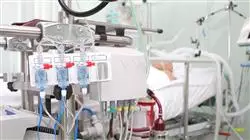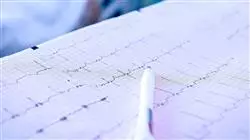University certificate
The world's largest faculty of medicine”
Introduction to the Program
With the Professional master’s degree in Update in Intensive Care Medicine you have the opportunity to update your knowledge in a practical way and without sacrificing scientific accuracy, in order to incorporate the latest advances in patient management in the Intensive Care Unit"

To treat critically ill patients, the professional must update their knowledge in order to identify, diagnose and execute a rapid action plan for any emergency that may arise. It is of vital importance to know the procedures and protocols to follow in cases of extreme emergency.
This Professional master’s degree aims to respond to the educational needs of physicians who work in an Intensive Care Unit based on three fundamental pillars.
The first of these is the constant need for physicians specializing in Intensive Care Medicine to update their knowledge, always in a continuous learning process. It is important to make the most of the time spent studying and updating. Second, a practical and useful approach for daily clinical practice. When treating critically ill patients, decisions need to be made quickly and in accordance with specific criteria. And, last but not least, an interactive and enjoyable teaching methodology that facilitates learning. The use of audiovisual resources, interactive graphics, enriched texts and online platforms that allow to receive the information and have a real learning experience.
This Professional master’s degree is not intended to be a program on Intensive Care Medicine that makes a systematic and exhaustive review of the entire body of knowledge of the specialty, but rather, one that seeks to select the most relevant topics for clinical practice and offer a useful update on each of them.
Improve your patient care with the knowledge offered by the Professional master’s degree in Update in Intensive Care Medicine"
This Professional master’s degree in Update in Intensive Care Medicine contains the most complete and up-to-date scientific program on the market. The most important features include:
- More than 80 clinical cases presented by experts in the different specialities
- The graphic, schematic, and practical contents with which they are created, provide provide scientific and healthcare information on those medical disciplines that are essential to professional practice
- Diagnostic and therapeutic novelties on the management of patients in the Intensive Care Unit
- Presentation of practical workshops on procedures, diagnosis, and treatment techniques
- An algorithm-based interactive learning system for decision-making in the clinical situations presented throughout the course
- Clinical practice guidelines on the different pathologies. These guides follow the scientific and pedagogical criteria of the main scientific reference
- All of this will be complemented by theoretical lessons, questions to the expert, debate forums on controversial topics, and individual reflection assignments
- Content that is accessible from any fixed or portable device with an Internet connection
This Professional master’s degree is the best investment you can make when selecting a refresher program, for two reasons: in addition to updating your knowledge in Intensive Care Medicine, you will obtain a qualification endorsed by TECH Global University"
Its teaching staff includes specialists of recognized prestige in the field of Intensive Care Medicine, who bring to this program the experience of their work.
The multimedia content, developed with the latest educational technology will provide the professional with situated and contextual learning, i.e., a simulated environment that will provide immersive training, programmed for training in real situations.
This program is focused on Problem-Based Learning, whereby the physician must try to solve the different professional practice situations that arise during the course. For this purpose, the specialist will be assisted by an innovative interactive video system, created by renowned and experienced experts in treating critical patients.
Increase your decision-making confidence by updating your knowledge through this Professional master’s degree"

Don't miss the opportunity to incorporate the latest advances in critical patient care into your daily medical practice"
Why study at TECH?
TECH is the world’s largest online university. With an impressive catalog of more than 14,000 university programs available in 11 languages, it is positioned as a leader in employability, with a 99% job placement rate. In addition, it relies on an enormous faculty of more than 6,000 professors of the highest international renown.

Study at the world's largest online university and guarantee your professional success. The future starts at TECH”
The world’s best online university according to FORBES
The prestigious Forbes magazine, specialized in business and finance, has highlighted TECH as “the world's best online university” This is what they have recently stated in an article in their digital edition in which they echo the success story of this institution, “thanks to the academic offer it provides, the selection of its teaching staff, and an innovative learning method aimed at educating the professionals of the future”
A revolutionary study method, a cutting-edge faculty and a practical focus: the key to TECH's success.
The most complete study plans on the university scene
TECH offers the most complete study plans on the university scene, with syllabuses that cover fundamental concepts and, at the same time, the main scientific advances in their specific scientific areas. In addition, these programs are continuously being updated to guarantee students the academic vanguard and the most in-demand professional skills. In this way, the university's qualifications provide its graduates with a significant advantage to propel their careers to success.
TECH offers the most comprehensive and intensive study plans on the current university scene.
A world-class teaching staff
TECH's teaching staff is made up of more than 6,000 professors with the highest international recognition. Professors, researchers and top executives of multinational companies, including Isaiah Covington, performance coach of the Boston Celtics; Magda Romanska, principal investigator at Harvard MetaLAB; Ignacio Wistumba, chairman of the department of translational molecular pathology at MD Anderson Cancer Center; and D.W. Pine, creative director of TIME magazine, among others.
Internationally renowned experts, specialized in different branches of Health, Technology, Communication and Business, form part of the TECH faculty.
A unique learning method
TECH is the first university to use Relearning in all its programs. It is the best online learning methodology, accredited with international teaching quality certifications, provided by prestigious educational agencies. In addition, this disruptive educational model is complemented with the “Case Method”, thereby setting up a unique online teaching strategy. Innovative teaching resources are also implemented, including detailed videos, infographics and interactive summaries.
TECH combines Relearning and the Case Method in all its university programs to guarantee excellent theoretical and practical learning, studying whenever and wherever you want.
The world's largest online university
TECH is the world’s largest online university. We are the largest educational institution, with the best and widest online educational catalog, one hundred percent online and covering the vast majority of areas of knowledge. We offer a large selection of our own degrees and accredited online undergraduate and postgraduate degrees. In total, more than 14,000 university degrees, in eleven different languages, make us the largest educational largest in the world.
TECH has the world's most extensive catalog of academic and official programs, available in more than 11 languages.
Google Premier Partner
The American technology giant has awarded TECH the Google Google Premier Partner badge. This award, which is only available to 3% of the world's companies, highlights the efficient, flexible and tailored experience that this university provides to students. The recognition as a Google Premier Partner not only accredits the maximum rigor, performance and investment in TECH's digital infrastructures, but also places this university as one of the world's leading technology companies.
Google has positioned TECH in the top 3% of the world's most important technology companies by awarding it its Google Premier Partner badge.
The official online university of the NBA
TECH is the official online university of the NBA. Thanks to our agreement with the biggest league in basketball, we offer our students exclusive university programs, as well as a wide variety of educational resources focused on the business of the league and other areas of the sports industry. Each program is made up of a uniquely designed syllabus and features exceptional guest hosts: professionals with a distinguished sports background who will offer their expertise on the most relevant topics.
TECH has been selected by the NBA, the world's top basketball league, as its official online university.
The top-rated university by its students
Students have positioned TECH as the world's top-rated university on the main review websites, with a highest rating of 4.9 out of 5, obtained from more than 1,000 reviews. These results consolidate TECH as the benchmark university institution at an international level, reflecting the excellence and positive impact of its educational model.” reflecting the excellence and positive impact of its educational model.”
TECH is the world’s top-rated university by its students.
Leaders in employability
TECH has managed to become the leading university in employability. 99% of its students obtain jobs in the academic field they have studied, within one year of completing any of the university's programs. A similar number achieve immediate career enhancement. All this thanks to a study methodology that bases its effectiveness on the acquisition of practical skills, which are absolutely necessary for professional development.
99% of TECH graduates find a job within a year of completing their studies.
Professional Master's Degree in Update on Intensive Care Medicine
At TECH Global University, we present you our Professional Master's Degree in Update on Intensive Care Medicine, a unique opportunity to acquire the most advanced knowledge in the field of intensive care medicine and expand your professional skills. Our Professional Master's Degree is taught in an online classroom format, allowing you to access quality education from the comfort of your home or any place you prefer. Online classes offer unique flexibility, as you can study at your own pace and adapt your learning schedule to your daily responsibilities. With online classes, you will enjoy numerous benefits. You will be able to access cutting-edge educational material, presented by experts in the field of intensive care medicine. In addition, you will have the opportunity to interact with other healthcare professionals through online platforms, participate in enriching discussions and share experiences that will enrich your education.
Update your knowledge in Intensive Care Medicine
.
Our Professional Master's Degree in Update on Intensive Care Medicine is designed to provide you with up-to-date and comprehensive education in this constantly evolving field. Through this program, you will have the opportunity to delve into the most recent advances in the diagnosis, treatment and care of patients in intensive care units. You will explore topics such as hemodynamic monitoring, mechanical ventilation, advanced life support and critical care management. In addition, you will learn how to use the latest technologies and medical tools available in the intensive care setting. Upon completion of our Professional Master's Degree in Update on Intensive Care Medicine, you will be prepared to face the most complex challenges in the field of intensive care medicine and provide quality care to critically ill patients. You'll gain the skills and knowledge necessary to make informed decisions, lead multidisciplinary teams and provide state-of-the-art care in highly complex situations. If you are looking to advance your career in intensive care medicine and be at the forefront of scientific and technological advances, TECH Global University is your best option. Join us and become an expert in intensive care medicine with our Professional Master's Degree.







